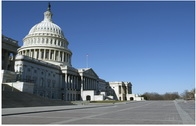Advertisement
ICBA Highlights Regulatory Burdens During Congressional Hearing

The Independent Community Bankers of America (ICBA) told members of Congress that community banks nationwide have identified regulatory burden as a top concern in providing credit in their communities. In a statement for the House Committee on Financial Services hearing, Who’s in Your Wallet: Examining How Washington Red Tape Impairs Economic Freedom, ICBA said that reducing regulatory burdens will help grow local economies and create jobs in local communities.
“In order to reach their full potential as catalysts for entrepreneurship, economic growth, and job creation, community banks must have regulation that is calibrated to their size, lower-risk profile, and traditional business model,” ICBA said in its statement for the record. “A one-size-fits-all regulatory system for the banking sector is tremendously detrimental to community banks and the local economies they serve and support. Working with community bankers from across the nation, ICBA has developed its Plan for Prosperity, a platform of legislative recommendations that will provide reasonable and meaningful relief for community banks and allow them to thrive by doing what they do best—serving and growing their communities.”
The multi-pronged Plan for Prosperity was designed in 2013 to help reduce excessive regulation for community banks while supporting greater regulatory accountability. Key provisions of the plan have been introduced in Congress and are moving through the House and Senate. The plan would:
►Provide “Qualified Mortgage” status for community bank portfolio loans,
►Exempt community bank portfolio loans from new escrow requirements,
►Expand mortgage rule exemptions for small servicers,
►Reinstate appraisal exemptions for certain community bank portfolio mortgages,
►Relieve publicly traded community banks and thrifts from accounting and auditing expenses,
►Support mutual banks with new charter options,
►Require a cost-benefit analysis for new rules,
►Reform the Consumer Financial Protection Bureau to ensure more balanced regulation, and
►Modernize the Federal Reserve’s small bank holding company policy statement to support additional capital for these institutions.
Referenced in ICBA’s statement was the George Mason University Mercatus Center’s recently released Small Bank Survey, which found that compliance costs have increased for more than 90 percent of community bank respondents. Additionally, the association reminded Congress that new mortgage regulations were enacted in response to abuses in which community banks did not engage. Community banks represent approximately 20 percent of the mortgage market, and the majority of that lending is concentrated in small towns and rural areas of the nation that are not effectively served by other financial institutions.
About the author





